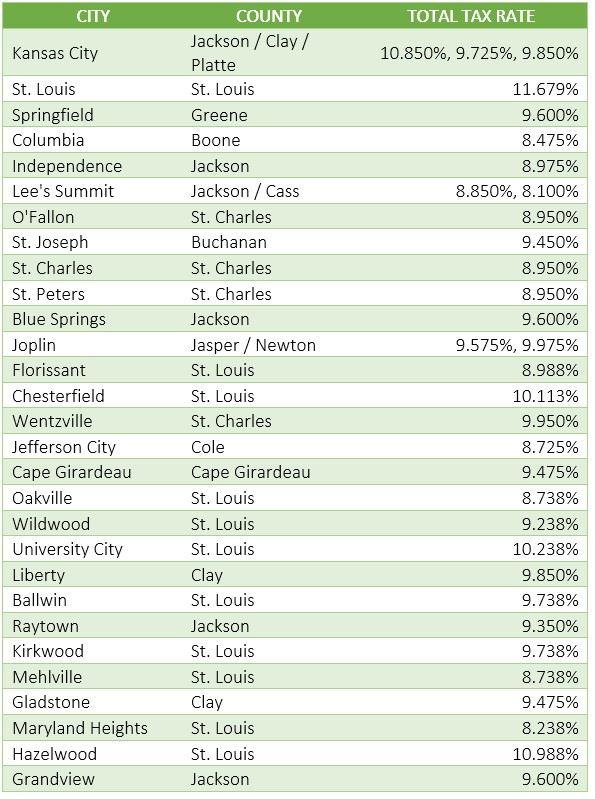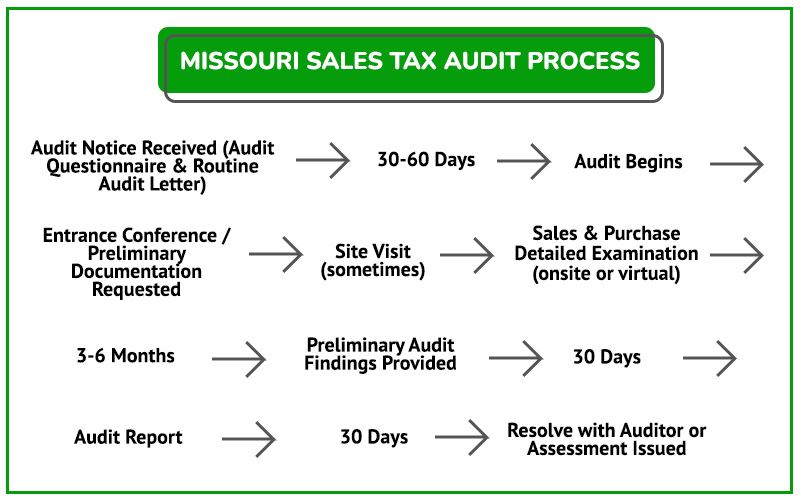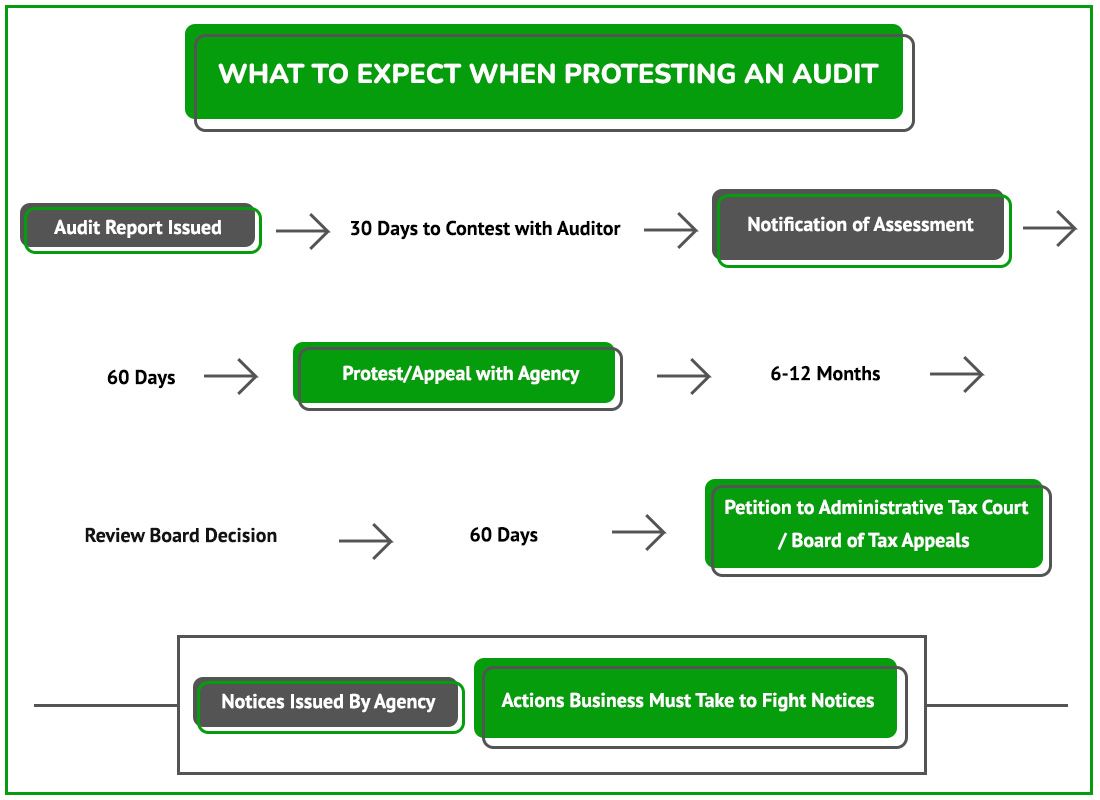
Missouri Sales and Use Tax & Audit Guide
This guide is for businesses that need straightforward answers on the following Missouri Sales and Use Tax subjects:
- Do I need to be collecting Missouri sales tax?
- Should I be collecting or paying Missouri use tax?
- What do I do if I should have been collecting but haven’t?
- I received an audit notice, what should I do?
- Guidance on fighting a sales tax assessment in Missouri.
Who Needs to Collect Missouri Sales and Use Tax?
Like most states, to be subject to Missouri sales tax collection and its rules, your business must:
1) Have nexus with Missouri, and
2) Sell or use something that is subject to Missouri sales tax.
How Is Nexus Established in Missouri?
According to the Missouri Department of Revenue, sales tax nexus is created in Missouri if a business has a physical presence in Texas, such as:
- Occupying and maintaining an office, distribution center, warehouse, or physical location where business is conducted.
- Having independent sales reps, employees, or agents conducting business in the state, including selling, delivering, or taking orders for taxable items in Missouri.
- Assembling, installing, servicing, or repairing products in Missouri.
- Owning, renting, or leasing real property or tangible personal property in Missouri, including a computer server or software to solicit orders for taxable items.
- Delivering goods to Missouri customers using your company-owned or leased truck.
- Maintaining inventory in Missouri using a third-party fulfillment service, such as Fulfilled by Amazon (“FBA”).
Additionally, business that do not have a physical presence in Missouri, can establish economic nexus by exceeding a certain annual sales threshold in the state. See the next section for details.
Economic Nexus (Wayfair Law) and Internet Sales in Texas
Missouri has not enacted an economic nexus law to date.
Which Sales Are Subject to Missouri Sales Tax?
General Transactions
If you have nexus in Missouri, the next step is to determine whether the products or services you sell are subject to Missouri sales and use tax. Like most states, unless an item is specifically exempt, sales and rentals of tangible personal property are subject to Missouri sales tax.
While the general rules seem straightforward, the application of Missouri’s sales tax rules and their nuances, complexities, and application to your business can get complicated. We recommend scheduling a time to review your specific situation with one of our sales tax professionals.
Common exemptions from Missouri sales and use tax:
- Medical Equipment
- Many items used in farming or manufacturing.
- Aircraft repairs
- Pollution equipment
Services
Generally, services are not subject to Missouri sales tax. However, the types of services listed here are subject to Missouri sales tax:
- Local and Long-Distance Telecommunications Services
- Fabrication Labor
- Telegraph services
- Utility services
Software
Missouri does not impose its sales tax on SaaS. However, Missouri taxes canned software. Custom software is not subject to Missouri sales tax because it is deemed the sale of a nontaxable service.
Shipping & Handling
Missouri takes the position that delivery and shipping charges are not taxable so long as they are separately stated and optional by the customer.
Determining Local Sales and Use Tax Rates in Missouri
Missouri’s base or statewide sales tax rate is 4.225%. However, local taxing jurisdictions (cities, counties, special purpose districts) can charge local sales on top of the 4.225%, potentially increasing the total sales tax that must be collected and remitted by the seller. Both the State and local sales taxes are remitted to the Missouri DOR with the businesses sales and use tax return.
The combined Missouri state + local sales and use tax rates for the largest 30 cities are listed below. A comprehensive list can be found here.

I Should Have Collected Missouri Sales Tax, But I Didn’t
Unlike many of our competitors who offer a one size fits all solution and blindly suggest filing a Voluntary Disclosure Agreement (VDA) in each state, our sales tax professionals will work with you to determine the best and most cost-effective solution for your business.
If you determine your business has nexus but you have not collected Missouri sales tax, the primary options are to:
- Register and pay back taxes, penalties, and interest, or
- Complete a VDA to eliminate penalties (and in some cases reduce your tax liability and avoid interest).
Here is what you need to know about each option to make the best decision for your business:
Option 1: Register to Pay Back Taxes, Penalties, and Interest
Sometimes the best solution for a business is simply to register with Missouri and pay back taxes, penalties, and interest. A VDA is not cost-effective if the past liabilities and penalties are minimal. Be wary of the tax professionals that recommend doing a VDA in these cases, they are looking to make a buck rather than looking out for your best interests. If you’re unsure what your past liabilities are, contact us and one of our state tax professionals will work with you to conduct an analysis and help you make the right choice for your business.
When to consider registration and payment:
- If you established nexus less than 4 years ago.
- The sales tax penalty is LESS than the professional fees charged for the VDA.
- Your business does NOT have a sales tax collected issue.
Beware: registering does not generally eliminate past liabilities
Option 2: Voluntary Disclosure Agreement (VDA)
Missouri’s lookback period: 4 years.
In many situations, voluntary disclosures are a useful tool to reduce extended periods of past exposure. For example, if you should have been collecting sales tax for 10 years, the voluntary disclosure limits the lookback period to 4 years. As a result, the benefit of doing a VDA often turns on:
- Whether the VDA limits lookback period. i.e. – you established nexus more than 4 years ago.
- The sales tax penalty savings is MORE than the professional fees charged for the VDA.
- You have a sales tax collected but not remitted issue.
I Received a Missouri Sales and Use Tax Audit Notice, What Should I Do?
Missouri regularly audits businesses that are required to charge, collect, and remit various taxes in the state. Businesses that receive a sales and use tax audit notice should consider the following:
- Unless you have experience handling Missouri sales and use tax audits, how can you trust that the state’s auditor is abiding by the rules and following proper procedure?
- How will you know when to provide documents or when to push back?
- Do you have a thorough understanding of your sales and use tax areas of exposure?
- Controlling the audit is paramount to the limiting exposure and shaping the results. Are you confident in doing that on your own?
If you are unsure of the answer to these questions and you do not have experience handling Missouri sales tax audits, hiring a professional might be right for you. Contact us and learn how our sales tax professionals can give you the peace-of-mind and confidence you need during your audit.
Please visit our resource pages for more detailed information and to help you evaluate critical decisions during your Missouri sales and use tax audit.
- The Audit Overview & Selection Process
- The General Audit Process
- Statute of Limitations Extensions & Issues
- Managing the Sales Tax Auditor
Missouri Sales Tax Audit Process
The audit process usually follows the process laid out in this flowchart. See the detailed guidance for each stage of the process in the sections below.

What to Expect After You Receive a Missouri Sales and Use Tax Audit Notice (Missouri Routine Audit Letter)
Many audits begin with a call out of the blue from a Missouri Department of Revenue’s sales tax auditor. Shortly after the call, your business will receive an audit notice which confirms that you were lucky enough to be chosen for a Missouri sales and use tax audit. To prepare for the audit, it is likely a good idea to start by getting a state and local tax professional involved.
What to Expect From A Missouri Sales Tax Auditor
- Auditor will conduct pre audit research.
- Auditor will often schedule and perform an entrance conference.
- Records will be requested (many of which the auditor is not entitled to and does not need).
What to Expect During The Audit
- Once the necessary records are received, the auditor will:
- Conduct the audit by comparing your Missouri sales and use tax returns to your federal income tax returns or bank statements to determine whether all applicable sales, or gross sales, were reported on your Missouri sales tax return(s).
NOTE: A slight error in how tax was charged on even a single type of transaction, when multiplied over three years, can add up to a considerable sales tax liability.
- Once the auditor is confident all sales are accounted for, they will review your exempt and out-of-state sales.
- Conduct a use tax audit – the auditor will request a detail of certain documents / accounts to make sure use tax was properly paid on applicable purchases. Common areas audited include:
- Advertising Expense
- Auto & Truck Expense
- Repair and Maintenance
- Rent (including related party rent)
- Office Expense
- Miscellaneous Expense
- Supplies
- Equipment
Despite publications to the contrary, if a business buys an item online without paying use tax, the business still has an obligation to remit the tax to Missouri. This often leads to shocking results for the unsuspecting taxpayer during an audit.
After the Audit – Understand and Defend Your Businesses Rights
Upon completion of the audit, there will usually be an exit conference with the auditor. The auditor will produce an audit report with corresponding workpapers to support the Missouri sales and use tax assessment. It is advisable to have a sales tax professional present during this meeting as this is your first opportunity to see the auditor’s findings and push back on areas where they have overstepped their bounds or misapplied Missouri’ sales tax laws.
We recommend businesses refrain from agreeing to the sales tax assessment until a sales tax professional has reviewed it for issues that should be challenged. Many businesses wind up drastically overpaying the state because the business owner or in-house accounting personnel were not well versed in the sales tax laws that, if challenged, could have reduced their Missouri sales tax liability.
The process of challenging a Missouri sales tax audit assessment is discussed in detail in the following sections.
Missouri Sales Tax Audit Protest Process Flow Chart

NOTE: If the deadlines are missed, you have a short period of time to pay the tax and seek a refund. If that deadlines is also missed, it can be very difficult to get case reopened.
Contesting Audit Findings with the Auditor
After an audit, the auditor will issue a Missouri notice of audit results (AKA the audit report). This document details the auditor’s findings so it’s important to carefully review and understand its implications. Any issues with the results are handled as follows:
- Auditee has 30 days to contest findings with the auditor.
- Documentational issues (exemption certificates, proof tax was paid, etc.) and calculations are worth addressing with the auditor.
- Legal interpretations of sales tax law are often not resolvable at this stage.
- If a resolution cannot be reached with the auditor, the next step is to appeal/protest the issue with the Missouri Review Board.
Appeal / Protest with the Missouri Department of Revenue
Any contested issues that were unresolved prior to the audit report being issued can be protested / appealed by the auditee. This is done after the Missouri Department of Revenue issues the Notice of Assessment.
- A protest / appeal must be done within 60 days of the Notification of Assessment issuance.
- If you miss the 60 days, in some cases you have may have additional time to pay the tax and file a refund claim.
- If both periods are missed, the assessment becomes final, and it is very difficult to reopen the audit.
If you have received a Notification of Assessment and have not at least talked to someone experienced in Missouri State and Local tax, now is the time before these deadlines are missed.
Decision of Review Board
If you cannot resolve the Missouri sales and use tax dispute through the protest / appeal process, the Missouri Department of Revenue will issue a decision. The decision gives you the opportunity to continue fighting the assessment by filing with the Board of Tax Appeals within 60 days.
Settling a Missouri Sales Tax Liability
Along the way, or even after one the critical notices are issued, there is the possibility to settle your Missouri sales tax case by negotiating with the Missouri Department of Revenue. Often, you can get better results here than with the auditor. If you or your professional seldom does state and local tax work, it might be difficult to evaluate fair versus unreasonable settlements. DO NOT try to negotiate a settlement without an experienced Missouri state and local tax lawyer or other professional.
Contest a Missouri Jeopardy Assessment
Missouri may issue a Notice of Jeopardy Determination in certain situations. The jeopardy assessment gives Missouri Department of Revenue accelerated rights and it may immediately begin to try and collect. Due to the jeopardy nature, the taxpayer only has 20 days to contest the assessment and must place a security deposit to fight the issue.
Missouri Administrative Court
If you cannot resolve the case within the agency, you still have one last shot to fight your Missouri sales tax assessment by going to the Missouri State Tax Commission to the Board of Tax Appeals. Although we generally don’t recommend it, you always have the option to skip the agency protest process and file in administrative court. That said, because neither party wants to spend the time and resources on the uncertainty of administrative court, continuing to challenge the assessment is often an effective way to maximize your settlement potential.
If your case is filed in administrative court, and the case proceeds to hearing, it is heard and decided by a neutral administrative law judge. Our team has handled hundreds of administrative court cases and can help your company receive the resolution it is entitled to. It is very similar to a court hearing and having an experienced representative is imperative.
Other Missouri Sales Tax Resources
Reviews

-
"Take Control of your sales tax with easy-to-use DIY tools. Get the guidance you need - without the high cost of full-service support."
Meet David, the Auto Repair Shop Owner (DIY)
- The DIY Business Owner -
"Get expert answers when you need them. Our on-demand consulting service connects you with tax professionals for quick, reliable advice—without long-term commitments."
Meet Mark, the Business Owner Who Needs Quick Answers
- The On-Demand Consultant User -
"Outsource your sales tax headaches to proven experts. Our full-service solutions handle compliance, audits, and dispute resolution—so you can focus on growing your business."
Meet Greg, the CFO of a Multi-State Manufacturing Company
- The Managed/Enterprise CFO -
"Stay in control while getting expert help when you need it. Our guided sales tax solutions give you access to professionals for compliance, audits, and appeals—without the cost of full-service management."
Meet Kris, the Multi-Store Gas Station & Convenience Operator: Multi-Location Owner (Guided Support)
- The Guided Business Owner -
"Jerry is the best!"
Jerry is the best! I made the mistake thinking I could deal with the use tax auditor on my own not realizing that I would be ...
- Gary O. -
"Sales Tax Helper Can Make Miracles Happen"
Sales Tax Helper can make miracles happen. Jerry was able to wipe hundreds of thousands of dollars off a NY sales tax bill ...
- Zalmi D. -
"I Will Definitely Be Using His Services Again"
Jerry was very helpful and listened to all our concerns. I will definitely be using his services again.
- Joyce J. -
"Representing Our Company Professionally"
Owning a Texas car dealership is demanding work, so taking on a Texas Sales Tax Audit was a daunting task for us – we didn’t ...
- Ata A.
